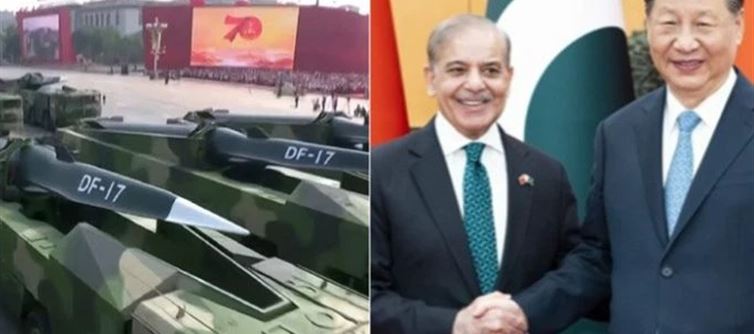
china Hypersonic Missiles: china, Pakistan's "all-weather ally" and largest weapons supplier, has reportedly denied Islamabad's request for the supply of Chinese-made hypersonic missiles and the transfer of technology for indigenous manufacturing of the same, in yet another significant setback for Pakistan's military aspirations following the crushing it suffered at the hands of indian armed forces during Operation Sindoor.
Why did china turn down Pakistan's request for hypersonic missiles?
China is reportedly concerned that, given Islamabad's recent rapprochement with the West, particularly the United States, pakistan would permit Western specialists to test Chinese-made advanced missile systems. Concern regarding the subpar performance of Pakistan's Chinese-supplied weapons in the most recent India-Pakistan conflict is another factor.
According to the indian Defence Research Wing (IDRW), a defense website, china has told pakistan that it has not created export versions of its hypersonic missiles and that none of the current models, like the DF-17 with hypersonic warheads, have been approved for export. As a result, the technology is off-limits, at least for the time being.
According to the article, beijing has also turned down Pakistan's request for a technology transfer for hypersonic missiles, which would have enabled the nation to produce these cutting-edge weapons domestically and lessen its reliance on defense imports.
China's hypersonic technology is meant for strategic deterrence
The majority of China's defense products, such as fighter jets, air defense systems, and missiles, are notable for having export-specific versions. However, the country has yet to produce advanced hypersonic missiles. As part of Beijing's larger strategy to limit the spread of its most sophisticated strategic weapons, particularly those that might be able to change the balance of power in the area or the world, china does not yet have any modified or export versions of its hypersonic missile systems.
One of the few countries to have created and perfected hypersonic technology is china, which views it as an essential part of its strategic deterrence, especially against the US and its allies. According to experts, china declines to sell these strategic weapons, even to a close ally like pakistan, because doing so might draw attention from other countries and heighten hostilities with adversaries.
Additionally, it has been argued that China's hypersonic capabilities are still in their infancy and require further research before they can be mass-produced and used.
Pakistan wants hypersonic tech to counter India
In order to keep up with India's quick advancements in missile technology, particularly the creation of its own hypersonic and ballistic missile systems, pakistan is rapidly increasing its stockpile of weaponry, particularly its missile systems. Pakistan seeks to bridge the technology divide with india, which has created its own hypersonic capabilities, such as the Hypersonic technology Demonstrator Vehicle (HSTDV), by purchasing Chinese hypersonic missiles.
A recent US intelligence report claims that Pakistan's economy and military might are entirely reliant on China. This is a serious issue for South Asia because beijing is likely to use any future conflict between india and pakistan as a test site for its weapons, including fighter jets, air defense systems, and missiles. According to the research, china accounts for almost 80% of Pakistan's total defense imports.
Why did china turn down Pakistan's request for hypersonic missiles?
China is reportedly concerned that, given Islamabad's recent rapprochement with the West, particularly the United States, pakistan would permit Western specialists to test Chinese-made advanced missile systems. Concern regarding the subpar performance of Pakistan's Chinese-supplied weapons in the most recent India-Pakistan conflict is another factor.
According to the indian Defence Research Wing (IDRW), a defense website, china has told pakistan that it has not created export versions of its hypersonic missiles and that none of the current models, like the DF-17 with hypersonic warheads, have been approved for export. As a result, the technology is off-limits, at least for the time being.
According to the article, beijing has also turned down Pakistan's request for a technology transfer for hypersonic missiles, which would have enabled the nation to produce these cutting-edge weapons domestically and lessen its reliance on defense imports.
China's hypersonic technology is meant for strategic deterrence
The majority of China's defense products, such as fighter jets, air defense systems, and missiles, are notable for having export-specific versions. However, the country has yet to produce advanced hypersonic missiles. As part of Beijing's larger strategy to limit the spread of its most sophisticated strategic weapons, particularly those that might be able to change the balance of power in the area or the world, china does not yet have any modified or export versions of its hypersonic missile systems.
One of the few countries to have created and perfected hypersonic technology is china, which views it as an essential part of its strategic deterrence, especially against the US and its allies. According to experts, china declines to sell these strategic weapons, even to a close ally like pakistan, because doing so might draw attention from other countries and heighten hostilities with adversaries.
Additionally, it has been argued that China's hypersonic capabilities are still in their infancy and require further research before they can be mass-produced and used.
Pakistan wants hypersonic tech to counter India
In order to keep up with India's quick advancements in missile technology, particularly the creation of its own hypersonic and ballistic missile systems, pakistan is rapidly increasing its stockpile of weaponry, particularly its missile systems. Pakistan seeks to bridge the technology divide with india, which has created its own hypersonic capabilities, such as the Hypersonic technology Demonstrator Vehicle (HSTDV), by purchasing Chinese hypersonic missiles.
A recent US intelligence report claims that Pakistan's economy and military might are entirely reliant on China. This is a serious issue for South Asia because beijing is likely to use any future conflict between india and pakistan as a test site for its weapons, including fighter jets, air defense systems, and missiles. According to the research, china accounts for almost 80% of Pakistan's total defense imports.




 click and follow Indiaherald WhatsApp channel
click and follow Indiaherald WhatsApp channel